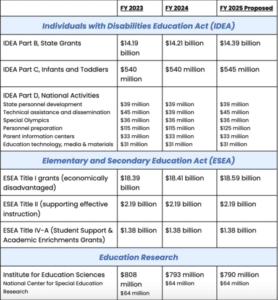March Policy News Round-Up
Congress finally passed a budget for FY 2024, the next appropriations cycle begins, and exciting legislation is introduced at both the federal and state levels. Learn more about what NCLD did in March.
FY 2024 Appropriations Passed
After Congress passed four (!) Continuing Resolutions between September 2023 and February 2024, the House and the Senate finally came to an agreement on a bipartisan funding bill for Fiscal Year (FY) 2024. Unfortunately, the agreement made last summer imposed budgetary caps restricting significant increases and investment in education programs. While the passed budget avoided some of the harmful proposed cuts, such as the proposed 70% cut to Title I, in draft bills released by the House Appropriations Committee last year, the bill overall does not make significant gains for investment in education programs nor puts IDEA funding on any significant glide path toward “full funding.”
See the funding levels in the budget table below compared to the previous year (FY 2023) and the President’s budget request for programs that impact students with disabilities, their families, and their educators, including programs under the Individuals with Disabilities Education Act (IDEA) and the Elementary and Secondary Education Act/Every Student Success Act (ESSA).
President Biden Releases FY 2025 Budget Proposal
President Biden’s Budget Proposal for FY 2025 was announced in early March, including requested funding levels for the US Department of Education (USED). Although this typically occurs after the prior year’s appropriations bills are passed, the staggered timeline of FY 2024 led to some overlap, where the POTUS FY 2025 Budget, which is often considered the “kickoff” to appropriations season, was released prior to the FY 2024 bills being signed.
Literacy Improvement for Transformation (LIFT) Act is Introduced
The Literacy Improvement for Transformation (LIFT) Act was introduced by Sen. Martin Heinrich (D-NM) with the aim of improving literacy outcomes for students. The legislation ensures every K-12 public school would have at least one full-time reading or literacy specialist on staff. The bill prioritizes entities working with high-need student populations, elevates biliteracy approaches to learning and protects oral-based indigenous languages, ensuring reading or literacy specialists hired through this funding stream spend at least 80% of their time working directly with students and teachers, and supports the ongoing development of reading specialists. NCLD’s CEO Jacqueline Rodriguez was quoted in Senator Heinrich’s press release announcing the bill, pointing out that “biliteracy specialists are uniquely positioned to support the nearly 850,000 English Learners with disabilities.”
Disability Rights Groups Provide Recommendations to Create More Inclusive Apprenticeship Programs
The Consortium for Constituents with Disabilities (CCD) Education Taskforce and the Employment and Training Taskforce submitted recommendations to the U.S. Department of Labor (DOL) on how to make apprenticeship programs more inclusive for people with disabilities. Currently, people with disabilities comprise 4.94% of the U.S. workforce, but only 1.12% of people in Registered Apprenticeship Programs. This significant underrepresentation indicates a need to make registered apprenticeship opportunities more accessible and inclusive of people with disabilities. Read the recommendations provided to DOL.
State Spotlight—MN RISE Act
A state-level version of the RISE Act was introduced in the Minnesota state legislature –HF 4565 in the House and SF 4525 in the Senate, where it has bipartisan support. Advocates have testified supporting the bill in both chambers and await formal committee votes. NCLD sent letters of support on the legislation that was entered into the record as written testimony and continues to support local leaders in their advocacy efforts.
In Case You Missed It
- Sen. Eric Schmitt (R-MO) signed on as a co-sponsor of the RISE Act, bringing the count of official supporters to 11 cosponsors in the House and 10 in the Senate.
- NCLD’s CEO Jacqueline Rodriguez moderated a panel at the Learning Policy Institute’s Capitol Hill briefing (Tackling Critical Teacher Shortages: Insights on Federal Policies & Programs).

